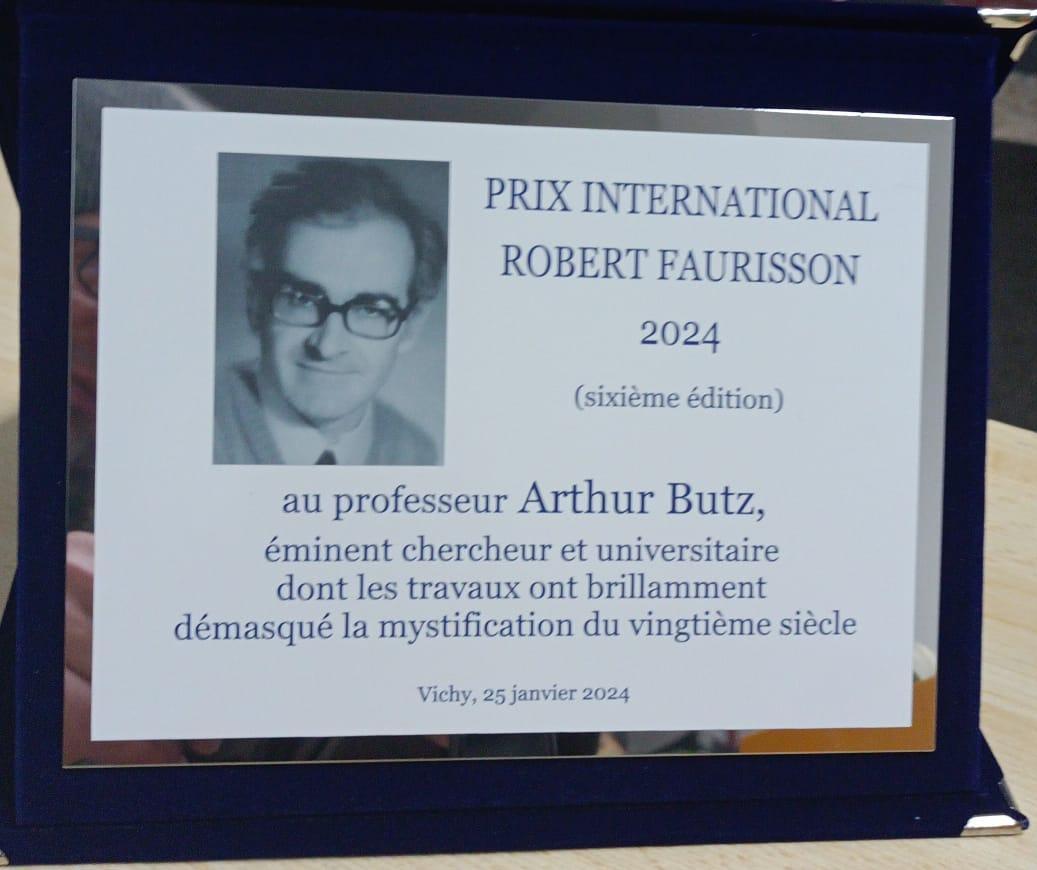On 24th January in Vichy the Robert Faurisson International Prize was awarded to the American revisionist scholar Arthur Butz, associate professor of electrical engineering at Northwestern University, Illinois.
The dedication read: “to Professor Arthur Butz, a distinguished researcher and academic whose work has brilliantly exposed the mystification of the twentieth century.”
This groundbreaking work, first published in 1976, is The Hoax of the Twentieth Century: The Case Against the Presumed Extermination of European Jewry. The first edition was published in England, four years after its author began research into the alleged ‘Holocaust’ of six million Jews in supposed homicidal gas chambers.
Butz does not simply address the scientific minutiae of whether gas chambers existed (or indeed whether it was possible for them to have functioned in the manner described by purported ‘witnesses’ to the ‘Holocaust’).
He sets the legend of the Shoah in its historical context, demonstrating the roots of the hoax – and the reasons why (for example) concentration camps existed, as opposed to the hoax version of ‘extermination camps’.

As Butz put it, in a phrase that should be repeated to every single student as a preparation for teaching them about what really happened to Jews and others during the 1940s: “There was a war going on during World War II.”
During the years immediately following publication of The Hoax of the Twentieth Century, revisionist scholarship expanded, until a wave of legal repression and extra-legal intimidation, typified by the recent extradition hearings against Vincent Reynouard.
In a preface to the most recent edition of his book, Butz reflected:
“A final proof, if needed, of our success is the fact of laws passed in recent years, in several European countries, criminalizing the publication of revisionist views on the Holocaust. Such literature circulated freely in Europe until the present revisionist movement started making its impact in the late ’70s.”

The Robert Faurisson International Prize was instituted in 2019, three months after Faurisson’s death, by his great friend Joe Fallisi, Italian tenor and human rights activist.
Last year’s winner was the German scientist and revisionist historian Germar Rudolf, who began work at the prestigious Max Planck Institute in 1990. He was dismissed by the Institute in 1994 after writing a detailed analysis of the purported homicidal gas chambers at Auschwitz-Birkenau. Rudolf drew attention to the fact that only insignificant traces of cyanide compounds can be found in areas where substantial residue ought to exist (had the orthodox history been correct).
Previous winners of the RFIP were Ursula Haverbeck (the inaugural winner in 2019), Vincent Reynouard, Wolfgang Fröhlich, and Monika and Alfred Schaefer.

As Joe Fallisi commented during the award ceremony, Robert Faurisson considered Arthur Butz’s book a masterpiece. “And indeed, in the context of historical revisionism of the Second World War, it represents the most remarkable overall study that has ever been written – and which no opponent of the revisionists has been able to even scratch.
“The courageous professor obviously suffered all imaginable persecutions by the well-known Lobby, but emerged magnificently victorious. In 2023 he turned 90. Assuring him of our full esteem and admiration, we wish him a long life and excellent health.”
Joe Fallisi added that the prize ceremony in Vichy, following a gathering of the Professor’s friends and admirers at his graveside, had gone ahead in a perfect and regular fashion this year. “In 2020 the Mayor of Vichy tried (in vain) to prevent the celebration of the Faurisson Prize by issuing a specific ‘police order’ on January 24. This mayor (Frédéric Aguilera) is now under investigation by the French judiciary. Certainly not for the ‘crime’ of ‘denialism’, but, more banally, for ‘misappropriation of public funds and concealment of public funds’.”



